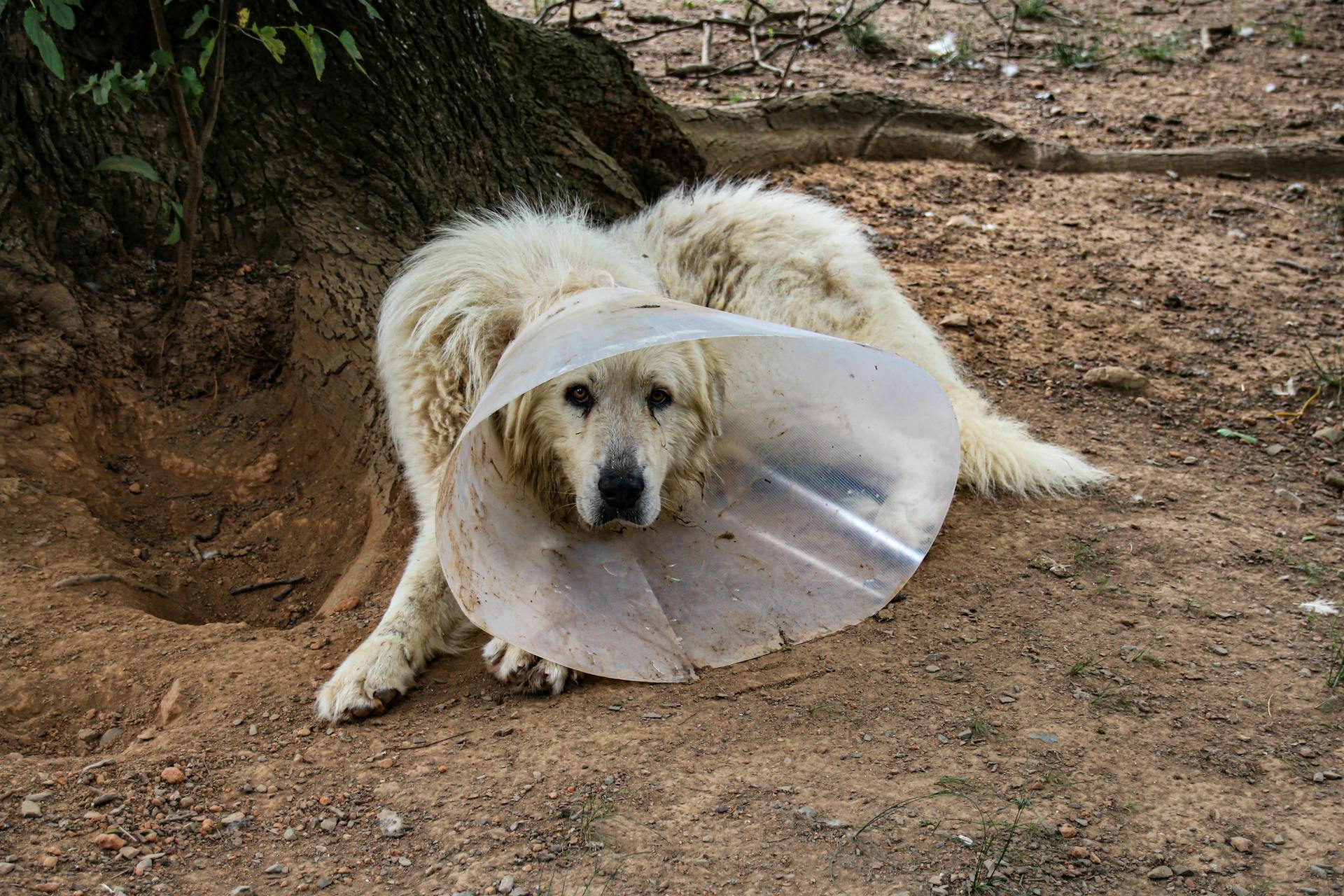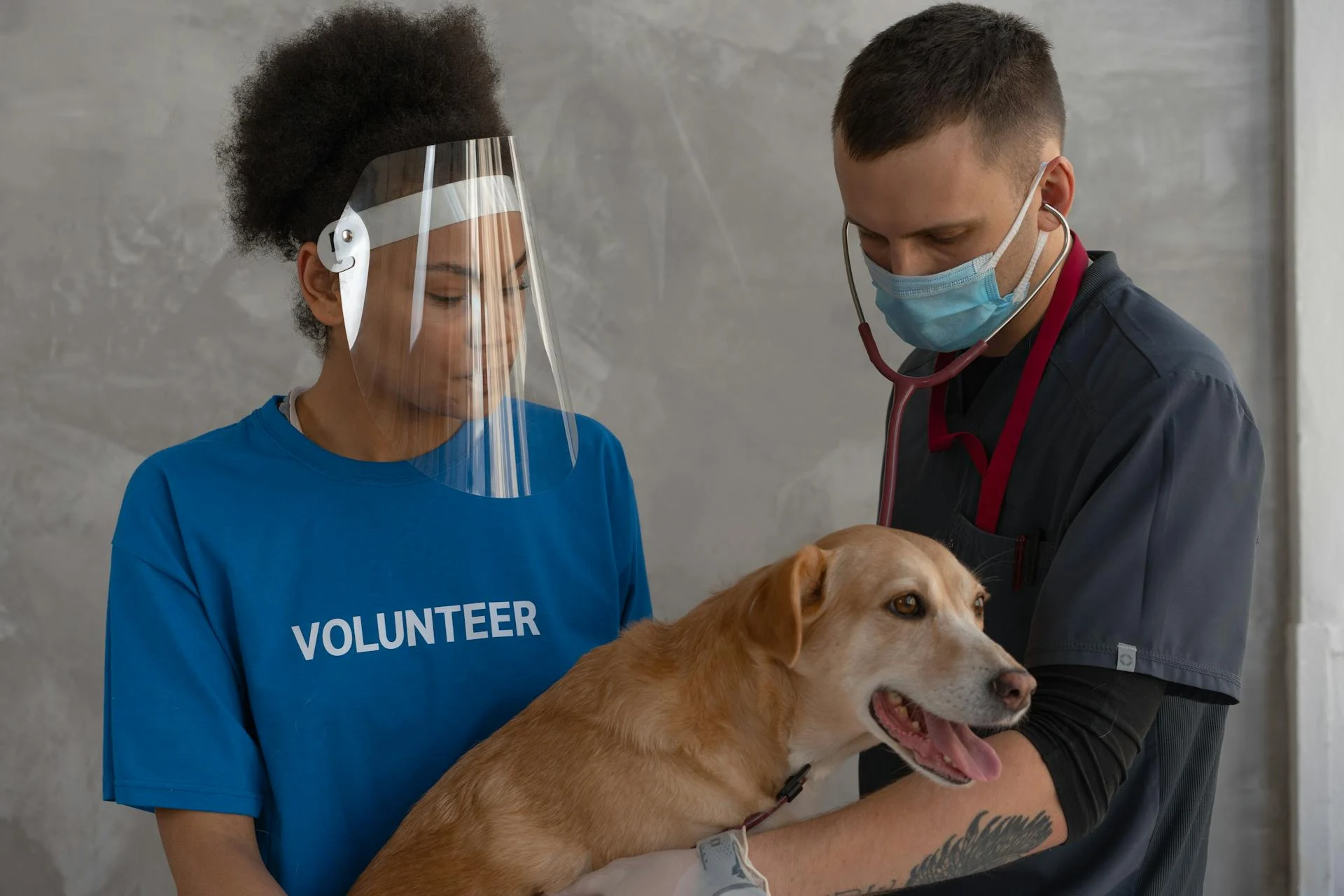
If your furry friend is suffering from colitis, finding the right dog food can make a huge difference. Look for a diet that's rich in fiber, such as pumpkin or sweet potatoes, which can help soothe the digestive system.
A well-balanced diet that includes omega-3 fatty acids, like those found in salmon oil, can also help reduce inflammation and promote healing.
Some dog owners have reported success with feeding their dogs a raw diet, which can be a great option for dogs with colitis. However, it's essential to ensure the raw ingredients are handled and stored safely to avoid contamination.
Feeding small, frequent meals throughout the day can also help manage colitis symptoms in dogs.
What Triggers?
Colitis in dogs can be a real challenge to manage, but understanding what triggers it is key to finding the right food solution.
Dietary changes can disrupt the delicate balance of bacteria in the gastrointestinal tract, leading to colitis. This can happen when transitioning from one type of food to another or when introduced to new ingredients without a gradual adjustment period.
Check this out: What Can You Feed Dogs Instead of Dog Food
Some common allergens in dog food include grains like wheat, soy, and corn, as well as proteins like beef and chicken. These can cause inflammation in the colon and make colitis symptoms worse.
Infections, such as bacterial or viral infections, can also trigger colitis in dogs. Gastrointestinal parasites, like giardia or hookworms, can lead to inflammation and irritation of the colon.
Stress can be a major contributor to colitis in dogs. Changes in their environment, routine, or social dynamics can impact the digestive system and lead to inflammation in the colon.
Here are some common triggers of colitis in dogs:
Symptoms and Signs
If your furry friend is suffering from colitis, it's essential to recognize the symptoms to ensure they receive proper care. Diarrhea is a common symptom, which can be bloody or mucousy.
Frequent bowel movements can be a sign that your dog is struggling with colitis. You may notice they're running to the bathroom more often than usual.
Abdominal pain and discomfort are also common symptoms, which can manifest as restlessness or a hunched posture. Your dog may even express discomfort when their abdomen is touched.
Loss of appetite and weight loss are also potential signs of colitis. The inflammation in the colon can disrupt your dog's normal eating patterns.
Here are some common symptoms of colitis in dogs:
- Loose, runny stools
- Vomiting and nausea
- Diarrhea
- Weight loss
- Increased flatulence
- Blood or mucus (or both) in the stools
- Abdominal pain
- Straining to pass stools
- Lethargy and fatigue
Straining to defecate can be a sign that your dog is experiencing colitis. This can be accompanied by abdominal pain and discomfort.
Diet and Nutrition
Proper nutrition is essential for managing colitis in dogs. Feeding a diet that is easy to digest and low in fat can help reduce inflammation in the digestive tract and ease symptoms such as diarrhea and abdominal pain.
Your veterinarian may recommend a prescription diet or suggest adding certain supplements to your dog's diet to help manage their colitis. It is essential to follow their recommendations carefully.
A grain-free diet can be beneficial for dogs with colitis, as grains can increase the risk of sensitivity in the GI tract and contribute to inflammation. Most holistic vets will recommend grain-free recipes.
Feeding a diet high in fiber can help regulate bowel movements and promote healthy digestion. Pumpkin is a great source of fiber and can be a beneficial addition to your dog's diet.
Adding digestive enzymes and probiotics to your dog's food can help improve digestion, alleviate symptoms, and enhance absorption of key nutrients. Examples of probiotics that can be added to dog food include lactobacillus and acidophilus.
Purina Pro Plan Veterinary Diets HA Hydrolyzed is an excellent choice among dog foods tailored for digestive problems in dogs. This formulation comprises easily digestible proteins that have been fragmented into smaller elements, making it a suitable option for dogs with delicate digestive systems.
It's essential to consult with your veterinarian before making any dietary changes for your dog, as they can help determine the best diet for your pet's unique needs and health conditions.
Suggestion: Is Grain Free Dog Food Better for Dogs
Treatment and Management
Your veterinarian may recommend a prescription diet that is easily digestible and low in fat, fiber, and other potential irritants to help manage your dog's colitis.
Dietary changes are a key component of treatment, and adjusting your dog's diet can make a big difference in their symptoms.
In many cases, probiotics or other supplements are recommended to support digestive health and help your dog's gut recover.
If your dog's colitis is caused by an infection or parasites, your veterinarian may prescribe medication to treat the underlying condition.
In severe cases, hospitalization and intravenous fluids may be necessary to manage dehydration and other complications.
To manage your dog's colitis, your veterinarian may recommend regular check-ups to monitor their condition and adjust their treatment plan as necessary.
Here are some common treatments for dog's colitis:
- Medications: Antibiotics, anti-inflammatory drugs, or immunosuppressive medications may be recommended to reduce inflammation and manage infections.
- Dietary Modifications: A limited ingredient diet or novel protein sources may be recommended to minimize triggers and support gastrointestinal health.
- Probiotics and Digestive Enzymes: Probiotics can help restore the balance of gut flora, and digestive enzymes can aid in the breakdown and absorption of nutrients.
- Stress Management: Creating a calm and predictable environment, incorporating regular exercise and mental stimulation, and using behavioral techniques to manage stress can all be beneficial.
- Additional Therapies: Acupuncture, hydrotherapy, or herbal remedies may be considered to support your dog's overall well-being and help manage colitis symptoms.
Holistic and Natural Options
Holistic and natural options can be a great way to manage your dog's colitis. Most holistic vets will recommend a grain-free diet to reduce sensitivity in the GI tract and inflammation.
Grain-free foods can be a good starting point, but it's essential to choose a recipe that is easy to digest and gentle on the digestive tract. Look for limited-ingredient diets with novel proteins and prebiotics to improve digestion and reduce inflammation.
Some holistic options for managing colitis include adding herbs to your dog's diet, such as pumpkin seed, calendula, marshmallow, and slippery elm, which have anti-inflammatory properties and help soothe the GI tract.
Here are some specific holistic options to consider:
Vegan Food Benefits
Plant-based diets can be a viable option for dogs with colitis, but it's essential to ensure they meet all nutritional requirements. A well-formulated plant-based diet can provide easily digestible carbohydrates and a variety of plant proteins.
Dogs with colitis may benefit from a carefully formulated plant-based diet that eliminates common allergens found in animal-based proteins. This can include ingredients like sweet potatoes, potato, quinoa, legumes, soy, and grains like rice or oats.
Some plant-based dog foods, such as Bonza, contain highly digestible proteins and carbohydrates, including quinoa, sweet potatoes, and legumes. These foods may support a dog's dietary requirements as an adjunct to the management and treatment of their colitis.
If this caught your attention, see: Dogs Eating Potatoes

A plant-based diet for dogs with colitis should be carefully balanced and supplemented if necessary to ensure they receive all essential nutrients. This is particularly important for dogs with chronic colitis, as their dietary needs may be more complex.
Here are some key nutrients to consider when choosing a plant-based diet for your dog with colitis:
It's crucial to work closely with a veterinarian or veterinary nutritionist to ensure your dog's plant-based diet meets all their nutritional requirements and supports their specific health condition.
Natural and Holistic Treatments
Holistic and natural treatments can be a great way to manage colitis in dogs. Many veterinarians recommend a grain-free diet, as grains can increase the risk of sensitivity in the GI tract and contribute to inflammation.
Adding digestive enzymes and probiotics to your dog's food can help improve digestion and alleviate symptoms. Examples of probiotics that can be added to dog food include lactobacillus and acidophilus.

Herbs such as slippery elm, calendula, marshmallow, and pumpkin seed can be beneficial for colitis. These herbs have anti-inflammatory properties and can help soothe and reduce inflammation in the GI tract.
Here are some specific herbs that may be helpful:
- Slippery elm: can help soothe and protect the mucous membranes in the digestive tract
- Calendula: has anti-inflammatory properties and can help reduce inflammation in the GI tract
- Marshmallow: can help soothe and protect the mucous membranes in the digestive tract
- Pumpkin seed: has anti-inflammatory properties and can help reduce inflammation in the GI tract
A limited-ingredient diet, novel protein diet, or prescription diet may be recommended by your veterinarian to help manage colitis. These diets are designed to be easy to digest and may contain added fiber or other nutrients to support digestive health.
Probiotics and digestive enzymes can be beneficial in managing colitis. Probiotics can help restore the balance of gut flora and improve digestive health, while digestive enzymes can aid in the breakdown and absorption of nutrients.
Regular check-ups with your veterinarian are crucial in managing colitis. They can help monitor your dog's condition and adjust their treatment plan as necessary.
You might like: What Nutrients Do Dogs Need in Homemade Dog Food
A food elimination diet may be recommended by your veterinarian to help identify any food allergies or intolerances that may be contributing to your dog's colitis. This involves cutting out all the foods your dog usually eats and using just two basic ingredients for a period of time.
Plant-based vegan dog foods may be a viable option for some dogs with colitis, but it's essential to consult with a veterinarian or canine nutritionist to ensure the diet meets all your dog's nutritional requirements.
Specific Diets and Foods
If your dog has colitis, it's essential to choose a diet that's easy to digest and low in fat. Look for dog food that's formulated to reduce inflammation in the digestive tract and ease symptoms like diarrhea and abdominal pain.
Limited-ingredient diets are a great option, as they contain a smaller number of ingredients and are designed to be gentle on the digestive tract. Novel protein diets, which use novel protein sources like pork, buffalo, or duck, can also be beneficial for dogs with food allergies or intolerances.
Recommended read: Is High Protein Dog Food Good for Dogs
Here are some specific dog food options that may be suitable for dogs with colitis:
- Purina Pro Plan Veterinary Diets HA Hydrolyzed
- Royal Canin Gastrointestinal High Energy
- Wellness Simple Limited Ingredient
- Bonza 100% plant-based dry dog food
These diets are designed to be highly digestible and may contain added fiber or other nutrients to support digestive health. Always consult with your veterinarian to determine the best diet for your dog's specific needs and health conditions.
Broaden your view: Health Extension Venison Dog Food
What Not to Feed
If you suspect your dog has colitis, it's essential to avoid feeding them certain foods that can trigger or worsen their symptoms.
High-fat foods, such as fatty meats and dairy products, are difficult for dogs to digest and can contribute to inflammation in the digestive tract.
Feeding your dog table scraps can be tempting, but many human foods are high in fat and seasonings that can trigger colitis symptoms.
Dairy products, including milk and cheese, can be problematic for dogs with colitis, especially those who are lactose intolerant.
High-fiber foods, such as beans and legumes, can also cause digestive upset and worsen symptoms in some dogs.
Broaden your view: Is Meat Fat Good for Dogs

Here are some specific foods to avoid feeding your dog with colitis:
By avoiding these foods, you can help manage your dog's colitis and improve their overall health and well-being.
Grain-Free Foods for IBD Symptoms
Grain-free foods can be a great option for dogs with IBD symptoms. Some dogs may benefit from a grain-free diet, as grains can increase the risk of sensitivity in the GI tract and contribute to inflammation.
Holistic vets often recommend grain-free recipes for dogs with colitis. This is because grains can exacerbate symptoms and make digestion more difficult.
If you're considering a grain-free diet for your dog, look for recipes that use novel protein sources like pork, buffalo, or duck. These protein sources can help reduce the risk of an allergic reaction.
Here are some grain-free food options that may be beneficial for dogs with IBD symptoms:
- One-Pot Braised Beef & Lamb Stew from The Honest Kitchen
- Whole Food Clusters- Grain-Free Chicken from The Honest Kitchen
- Dehydrated, Grain-Free Turkey Recipe from The Honest Kitchen
- Dehydrated, Limited Ingredient Duck Recipe from The Honest Kitchen
Remember to consult with your veterinarian before making any changes to your dog's diet. They can help you determine the best course of action for your dog's specific needs and health conditions.
Frequently Asked Questions
Is white rice good for dogs with colitis?
Yes, white rice is a suitable food option for dogs with colitis, as it is easily digestible and can help calm their stomach. However, it's essential to consult with a vet for a comprehensive treatment plan.
Are probiotics good for dogs with colitis?
Yes, probiotics can help alleviate symptoms of colitis in dogs, and are often used in conjunction with dietary changes and other natural remedies to manage the condition. Adding probiotics to your dog's diet may help prevent future episodes of colitis.
Sources
- https://growlingtums.co.uk/what-to-feed-a-dog-with-colitis-your-dogs-best-foods/
- https://www.thehonestkitchen.com/blogs/pet-wellness/colitis-and-gi-upset-in-dogs
- https://www.thefarmersdog.com/digest/colitis-in-dogs-what-is-it-and-how-is-it-treated/
- https://www.bonza.dog/2023/06/best-dog-food-for-colitis-uk/
- https://newpawsibilities.com/what-is-the-best-dog-food-for-colitis/
Featured Images: pexels.com


